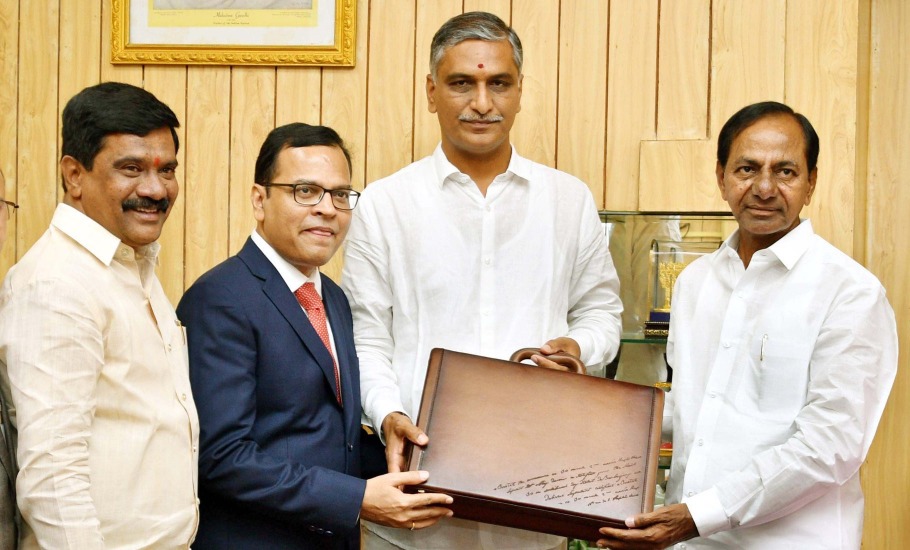
In Telangana’s ₹1.82-lakh-crore budget, politics overtakes economics
The state budget for 2020-21, presented in the assembly on Sunday (March 8), focused heavily on welfare spending despite the adverse financial situation in the wake of slowdown, dwindling revenue collections and slash in central funds.

For the ruling Telangana Rashtra Samithi (TRS), good politics and bad economics can co-exist peacefully.
For a party that has acquired an air of invincibility with a string of electoral victories, financial crunch is not a matter of concern as much as non-implementation of poll promises is.
No wonder that the state budget for 2020-21, presented in the assembly on Sunday (March 8), focused heavily on welfare spending despite the adverse financial situation in the wake of slowdown, dwindling revenue collections and slash in central funds.
Related news: Budget 2020: KCR terms it ‘atrocious’ but Jagan chooses to remain silent
Brushing aside the harsh financial realities, the TRS government made massive allocations for populist schemes, covering cash dole-outs to farmers and other sections, and increased the number of beneficiaries for various welfare programmes.
Ambitious outlay
At ₹1.82 lakh crore, the budget outlay is quite ambitious, given the dip in revenue collections across the sectors and a reduced share in the central funds. In fact, the growth of the State’s Own Revenues in 2019-20 is estimated to be 6.3%, much below the growth of 16% achieved in the previous year.
Despite highlighting the dwindling revenues and cuts in Central grants due to the impact of economic recession, Telangana has increased the budget size by nearly 25% over last year, which comes as a surprise since in 2019 the budget size was slashed by 20% citing economic recession.
The heavy accent on welfare can be seen from massive allocations made to the schemes that form the core of the ruling party’s poll promise — ₹14,000 crore for Rythu Bandhu (a no-strings-attached investment assistance of ₹10,000 per acre per year), ₹11,758 crore for Aasara social security pensions, ₹10,500 crore for two-bedroom houses for poor families and ₹6,225 crore for loan waiver scheme.
Related news: TRS, BJP slug it out as farmers rue delay in setting turmeric board
Presenting his maiden budget, the Finance Minister T Harish Rao, who is Chief Minister K Chandrasekhar Rao’s nephew, announced a reduction in the age limit for old-age pensions for vulnerable sections from 63 to 57 years and waiver of all outstanding crop loans of up to ₹1 lakh in four installments.
An amount of ₹1,198 crore would be released immediately to waive off outstanding crop loans of below ₹25,000 belonging to 5.83 lakh farmers at one go.
The waiver of loans above ₹25,000 and up to ₹1 lakh per farmer requires ₹24,738 crore. This will be done in four installments.
Telangana is now spending ₹40,000 crore on welfare, besides ₹10,000 crore on power subsidy.
Financial crunch
The government’s largesse comes in the backdrop of inclement economic weather. In his budget speech, the Finance Minister himself admitted that the economic slowdown had resulted in the reduction in tax devolution and other transfers to the state by the Centre and also caused a decline in the growth of the state’s own revenues.
The central tax devolution to the State is expected to go down by ₹3,731 crore in 2019-20 while there have been delays and shortfalls in the release of the State’s share in Integrated Goods and Services Tax and GST compensation.
Following the recommendations of the 15th Finance Commission, there will be a reduction in the share of Telangana in Central tax devolution from 2.437% to 2.133 % resulting in the reduction of tax devolution by ₹2,384 crore in 2020-21.
The GST compensation of around ₹933 crore is still pending.
Related news: AAP’s hat-trick in Delhi rekindles KCR’s plan to revive Federal Front
“Despite the adverse developments which are beyond our control, the Government is confident of overcoming the situation with appropriate strategies and keep up the growth momentum in the State.
“Though there was reduction in share in central taxes and grants, these shortfalls are being overcome with State’s own sources and we should be spending as per the budget estimates,” Rao said.
Following the slowdown, the GSDP growth has declined from 14.3 % in 2018-19 to 12.6% in 2019-20. The state’s own revenue average growth rate, which stood at an average of 21.5% in the last five years, has come down to 6.3 % this year, a sharp decline of 15.2%.
The Minister asserted that the loan waiver scheme would be fully implemented despite constraints on account of the economic slowdown.
Sale of lands
“We have several alternative plans. If the revenue receipts are not up to the expectations, we will explore other alternatives and change our plans,” the Finance Minister told The Federal.
The government has drawn up plans to sell the vast extent of lands of the housing board and other institutions to meet the expenditure on welfare schemes. It means that the land bank would help in continuing the welfare schemes.
Related news: Telangana, Andhra Pradesh to pass resolutions against NPR, NRC
Also, it has also decided to enhance the income accruing from sand and other minerals. The government expects to raise ₹5,500 crore through mines and minerals, both considered as non-tax revenues.
“This is an inflated budget, indicating that real expenditure will be much less than budget allocations,” said senior analyst and former member of the Legislative Council Prof K Nageshwar.
There has been no emphasis on job creation or skill upgradation, he lamented.

